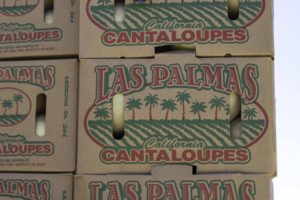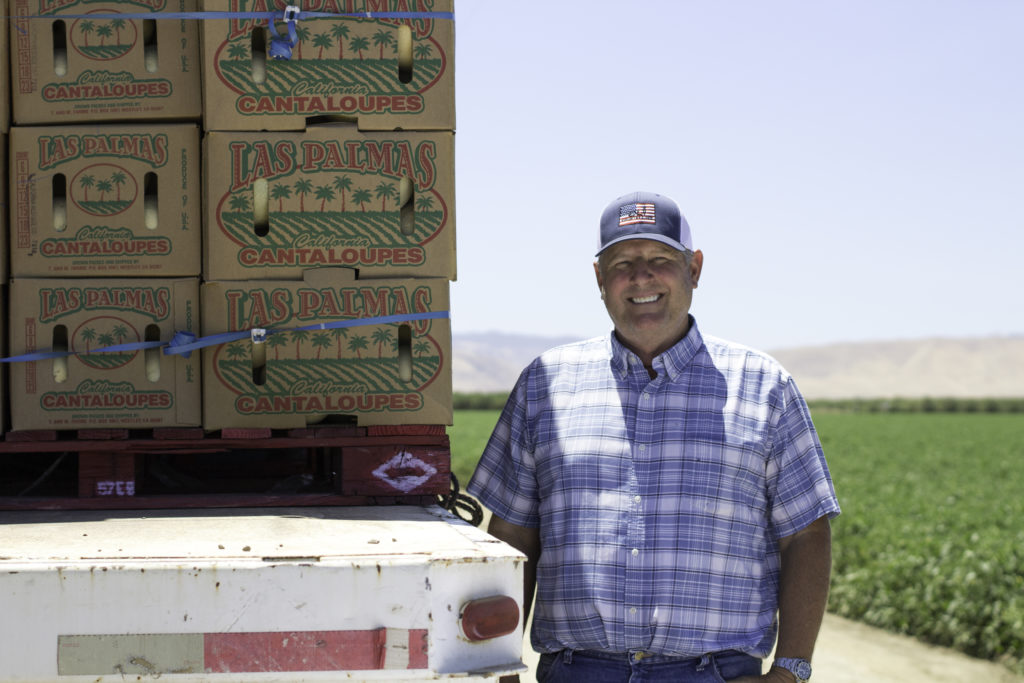Meet the Farmer: Matt Maring
Labels on boxes of melons grown by the Maring family mean so much more than just “Palm Tree Produce” translated in English. The Las Palmas Produce brand with an image of palm trees overlooking farm fields is deeply rooted in California agriculture.
Matt Maring is a third-generation farmer whose family first grew lima beans in southern California. In the mid-1960s, Matt’s father packed up the family (which included Matt and his seven siblings) and moved to the Central Valley. Ever since, Patterson, CA has been the home of Las Palmas Produce.
For the last 25 years, Matt and his brother Tom have run the family business bringing diversification to the brand. Today the company still farms lima beans, but also grows cantaloupes, watermelons, almonds, cannery tomatoes, garlic, walnuts, bell peppers, wine grapes and more.
“One of the best parts of being a farmer is walking the fields and seeing what your products look like and then being able to take them home to enjoy with my family,” he said.
Matt admits the Las Palmas Produce brand is small when compared to the volume produced by of most California cantaloupe growers. But that’s fine with Matt. It allows him to farm other products and paying closer attention to quality and providing improved consistency.
Matt enjoys looking back on the tradition of farming passed down to him by his father and that he is now passing on to his own kids. He is the father to three. One of his sons has already begun working for him on the farm.
“Seeing my son get to learn the day-to-day work of being a farmer is great,” he said. “Watching my son come into the business and helping him learn how to produce high yields and good quality produce makes my job successful.”
Like every industry, change is always expected and the cantaloupe industry is no different. “We’ve got fewer packers and more consolidation when it comes to growing cantaloupes,” Matt observes “With these changes the industry has had to undergo, our marketing departments for each of us growers has become full time in order to get these melons out to get them to the retailers.”
A cell phone interruption is no surprise when it comes to working with farmers. In fact, while we visited Matt’s farm he received a call from one of the salesmen responsible for selling his melons. The conversation went on with the salesman asking how the product was looking; when more would be ready to ship; and what date did he plan to harvest. After answering the caller’s questions, goodbyes were said and the call had ended Matt said, “Its crazy out here. That guy hustles more melons for me than anyone else.”
The relationship with this salesman is critical to the farms’ success.
But what about consumers?
Matt predicts some changes will have to be made for the future of Las Palmas Produce.
“We’re going to have to adapt to provide consumers with a great product,” he says, noting the potential changes on his farm that reflect what consumers want. “I still believe that California cantaloupe will continue to remain the true summer melon.”
Like most California farmers, Matt worries about shortages of water, labor costs and environmental issues. But he remains excited about the future of the California cantaloupe industry.
“The industry is constantly working on improving cantaloupe varieties and keeping them consistently available each year from May through October,” emphasized Matt. “The next generation of farmers will lead the charge in this direction using what they have learned from their parents and grandparents before them. This next generation of California farmers is going to be great. It’s exciting to watch them.”









